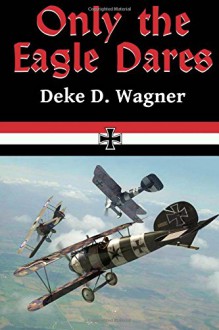
"ONLY THE EAGLE DARES" continues from where 'The Eagle and the Albatros' left off.
It is late July 1917. Willi Wissemann, formerly the commander of Jasta 23b (a Bavarian fighter unit), is recuperating at home with his mother following a harrowing escape from French captivity. Despite the difficulties he had faced following the crash of his plane deep in enemy territory, his capture, and treatment for the severe wounds he sustained in the crash, Wissemann is consumed by the desire to return to frontline flying. He almost doesn't make it, following an altercation with a superior officer which results in him being demoted and placed with another Jasta in the Champagne sector, flying against the French. Wissemann has issues with his Jastaführer, but manages to avoid getting into any serious trouble owing to his proven abilities to lead pilots into combat and his remarkable fighting prowess in the skies above the Western Front.
All the while, tragedy on a personal level dogs Wissemann seemingly at every turn. But by January 1918, Wissemann is on the rise again, having been promoted back to Hauptmann and placed in command of Jasta 23b again. Along the way, Wissemann has rubbed shoulders with Anthony Fokker, the famous Dutch aircraft designer, and Rittmeister Manfred Freiherr von Richthofen himself, Imperial Germany's top fighter ace and leader of JG-1, the most famous fighter wing in the Imperial German Air Service.
Wissemann bravely puts himself at risk every day he flies over the Front. His enemy is now the British and he is back in the Somme sector, where he first flew combat in 1916 as a 2-seater pilot on artillery spotting, bombing, and reconnaissance missions. Again, as in 'The Eagle and the Albatros', the aerial combat sequences in this novel are very well written and compelling. As a reader, I could almost hear the whine of machine gun bullets while violently manoeuvring my fighter plane, trying desperately to stay alive whilst determined to bring down an enemy plane.
Yet, there were other parts of the novel that could have used additional editing. And some of the characters were little more than thumbnail sketches or caricatures. That's why I give "ONLY THE EAGLE DARES" three (3) stars. It's a good yarn but with a little more editing, it could have been a much better crafted novel. (less)

 Log in with Facebook
Log in with Facebook 






